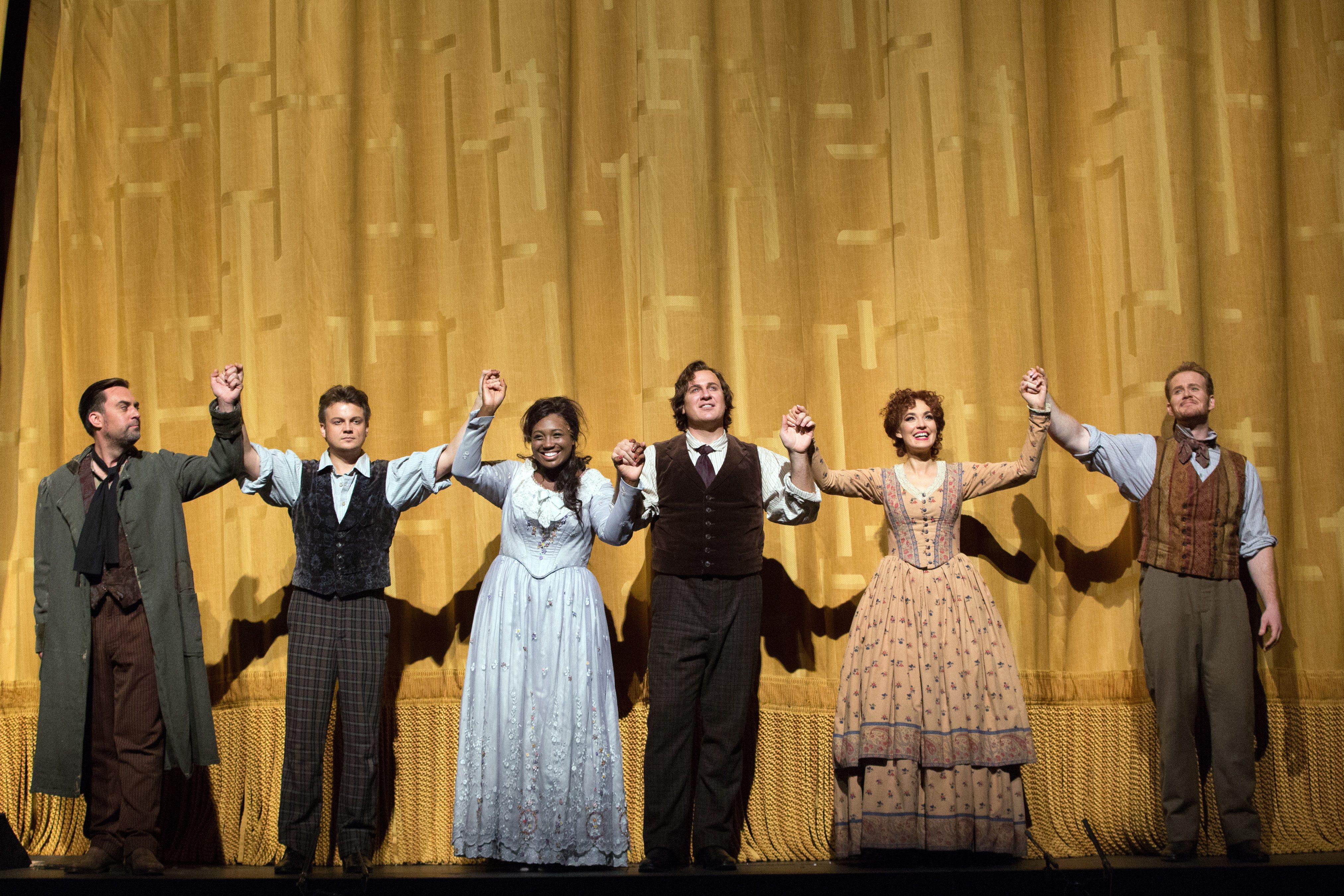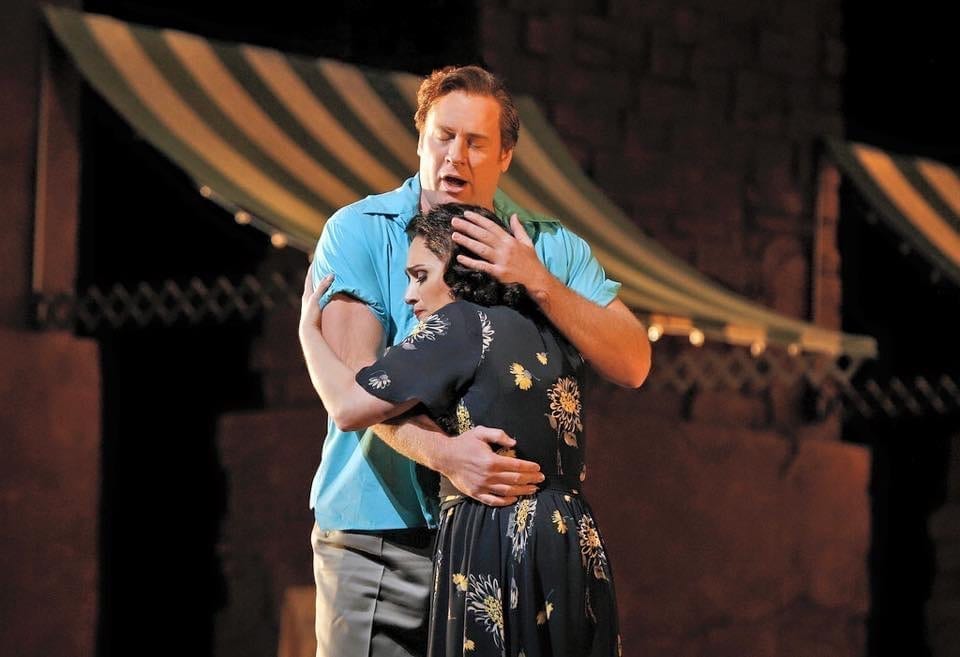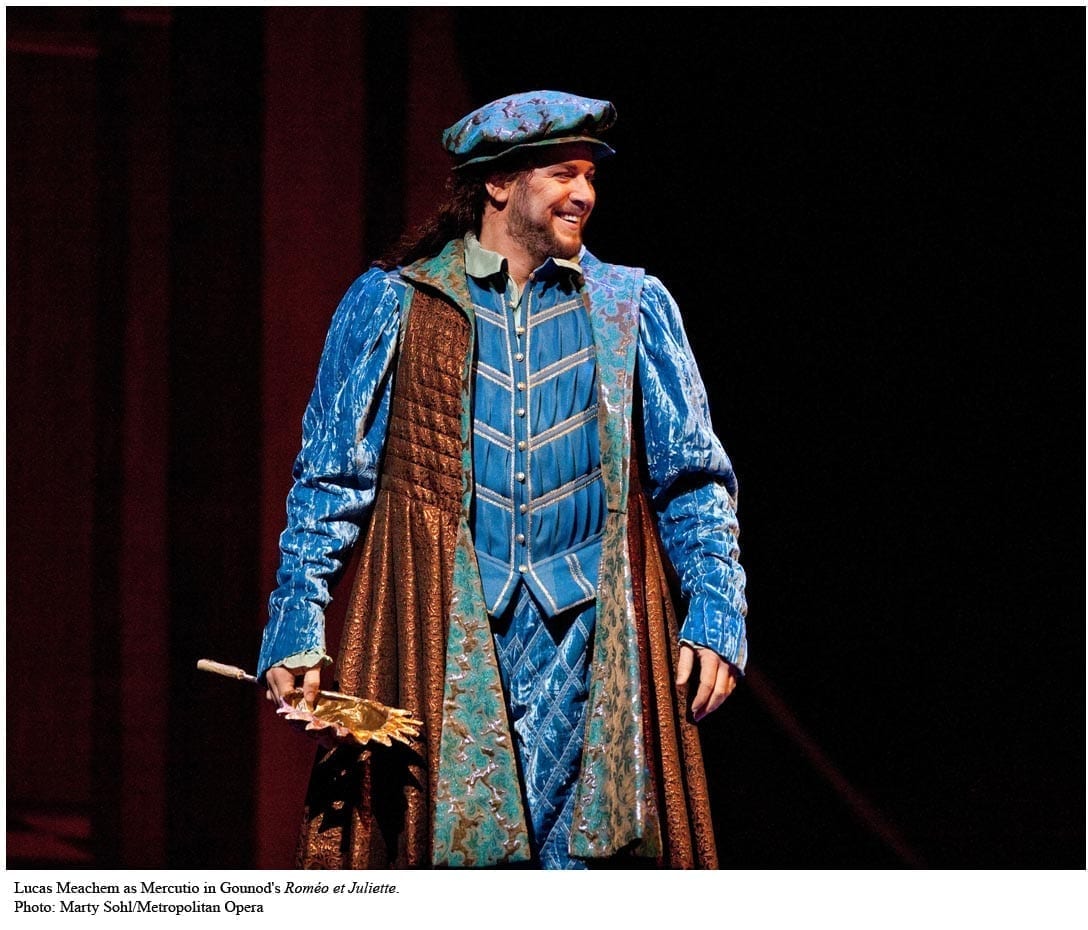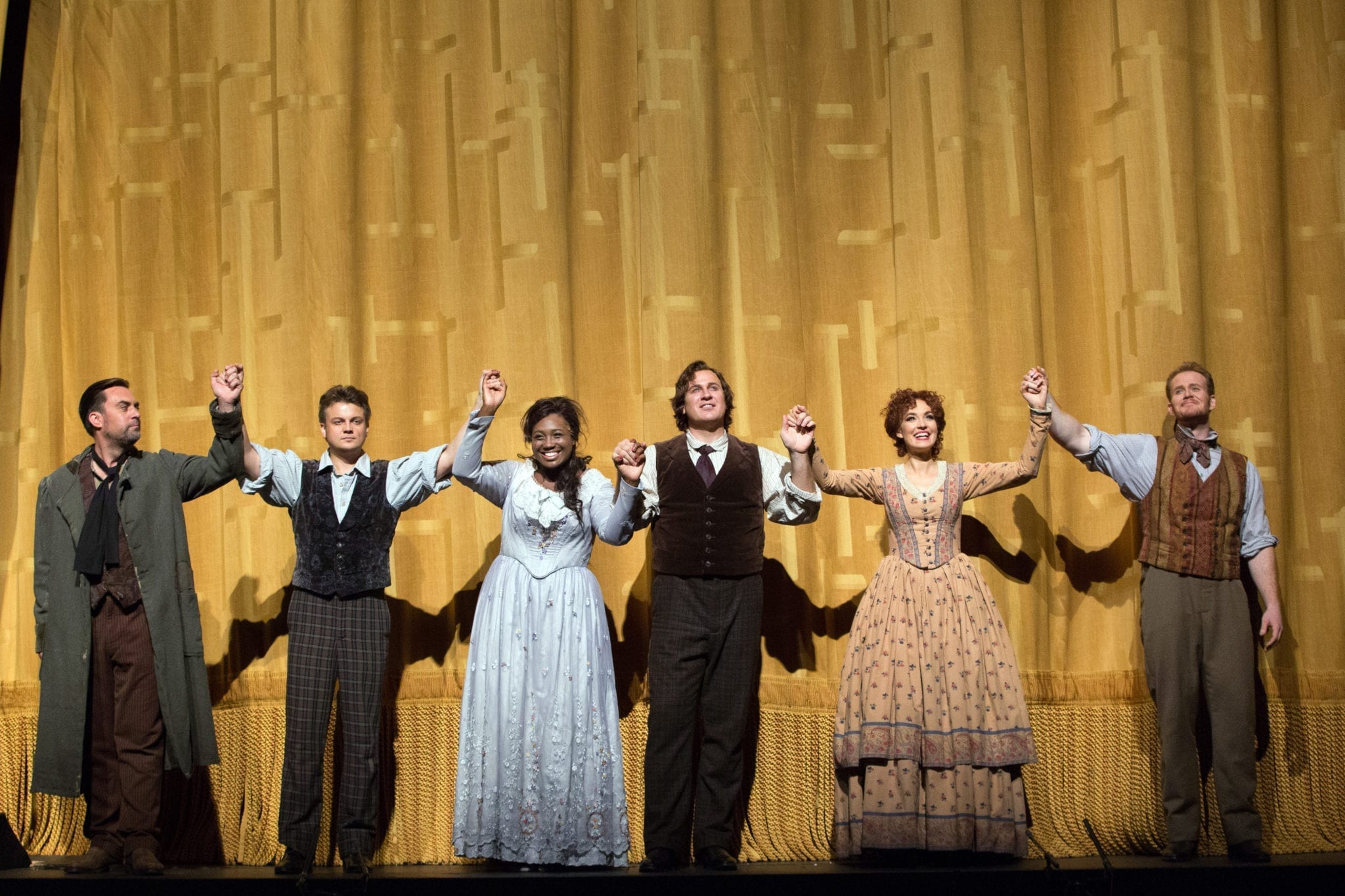
My Met debut was General Rayevsky in War and Peace at 29 years old.
There were 52 soloists on stage, 346 people total, and I was given the option not to bow because there were so many people involved in the show. I never took it.
I bowed every night with the cast stretched out across the entire stage: I wanted to soak up as much as I could. Every night, I looked up at the Sputnik chandeliers and the iconic balconies with the world’s biggest smile. I felt so grateful to have made it to the Met.
The Metropolitan Opera receives a lot of criticism for its questionable artistic and financial decisions. Expectations are high from a demanding public and it’s easy to make judgments from the outside.
Many people don’t understand the experience of what it’s like to be in the center of the Met’s magical music-making. That’s why I’m here! To provide you with an insider’s perspective.
What The Met Means
For many people, the Met serves as a reference for what the ideal model for opera should be. When I was young, I used to look at the Met’s cast lists to see who were the baritones in lead roles. For example, when I was learning Marcello as a student at Eastman, I looked up who was singing the role at the Met. At the time, it was Dwayne Croft. He sang lots of their baritone repertoire in the 90s. So I grew up idolizing him, as well as Bryn Terfel and Dmitri Hvorostovsky. I looked up to them way more than I did any athlete. As a young singer, I really thought that they were the best in the world because they were singing at the Met, despite never having heard them live.
At some point in their life, singers (and even non-singers!) are hit with the wonder of the Met and its prestigious place in the classical music world. For singers specifically, ending up on the Met stage is like making it to the mountain top.
But the truth is, it’s a real place with real people!

Opera Idols
One of the most surreal things about singing at the Met is getting to sing alongside your idols. It’s like getting to shoot hoops with Michael Jordan! Over time though, you learn that they’re just regular people with extraordinary talents. I’ve become friends with some of them, and I get a lot more out of those relationships than just idolizing them.
These friendships are what keep me grounded at the Met.
I aim to treat them as people who are just trying to get by. They put their shoes on one foot at a time just like me. Personally, I am genuinely grateful to meet every kind of singer; from superstars to those just starting out. The Met has provided me the opportunity to meet extraordinary people and become co-workers with them, instead of just being a fan.
For instance, this one time during one of my first rehearsals at the Met, I was chatting with a few singers and suddenly everyone’s eyes widened. I heard someone say, “Lucas!” and it was Bryn Terfel, right behind me! I played it cool. He asked me to see a movie with him and our buddy Paul Groves. Since then, he’s become a really good friend of mine but that first time hanging out was so surreal.
Every time I first arrive at the Met for a new gig, it’s hard not to get distracted by the grandeur of the place and all of the amazing past artists who worked there. When I use a prop or wear a costume with the name Del Monaco, Milnes, or Domingo on it, it’s awe-inspiring. You take a moment to think about the fact that your favorite singer ever has been in your dressing room, but it’s only for a second. You have an important job to do, and you can’t get distracted!
What’s also really cool is seeing the names of the next generation of opera singers. For instance, when I check out a library book and I see that Lisette Oropesa and Nadine Sierra also checked it out, it shows how the Met connects generations of amazing singers.
Amongst those who sing at the Met, there is an honest camaraderie and very little competition. We’re all in the same boat, and we all feel the same pressure to succeed, regardless of what level we’re at individually.
There’s not one singer who doesn’t go out and try to sing his/her best, so very few are unsupportive. We all understand the difficulties of the career, and so we always wish each other the best.
Filling The Hall
The acoustics in this 3,800-seat hall are fantastic. Even though it’s a big hall (most European opera houses are about half the size), you get a “ping” back when you sing with resonance; just enough to sense if you’re getting your voice out or not. It’s a very honest hall, and if a singer pushes their voice or doesn’t use resonance, it’s apparent in the sound.
In many ways, the Met is no different than any other opera company. You have to be prepared, show up on time, be presentable, act professional, sing with a focused sound, etc. It’s not like you go to the Met and you’re magically a better musician. You just do what you do all the time.
It’s easy to feel the need impress at the Met. There’s a lot of pressure, both good and bad. But if you’ve made it this far, you’re obviously a good singer. My advice is to get the fact that you’re singing at the Met out of your head as quickly as possible.
I try not to think about that much, and focus on the character. The correct way to approach the acoustics is projecting with one’s true and authentic voice. Other than that just try not to overthink or overdo.
I also focus on bringing something unique to the table, because there have been so many other singers there before me, and I do that by being true to my voice. If I were to succumb to the pressure and push my voice, it would only do the opposite and detract from doing my best.
Well-Oiled Machine
Everything about this place is consistently world-class.
People are so good at their jobs here. What I love most about the creative and production team is that I never have to ask for something twice. They’re so responsive to every artistic need. Even down to the spirit gum they use on the wigs—it’s this high-quality glue that blends the wig with the skin beautifully, but it’s pretty pricey. Those little things make such a big difference.
The stage managers are so on top of it every night. They’re prepared for anything that gets thrown at them, and always have an air of calm professionalism. There’s nothing they can’t deal with. If the place caught on fire, or if a pile of some dead person’s ashes was thrown into the pit, they’d take care of it swiftly and efficiently. They handle everything with aplomb and a strong, quick hand.
Every time the chorus sings, I’m so impressed by their top to bottom consistency. Any of the chorus singers could easily have a solo career if that’s what they wanted. The same is true for the children’s chorus: what a great work ethic and enthusiasm for opera!
The orchestra is so emotive—you hear it from each section and you can feel their sensitivity towards the singers. They take a lot of pride in playing the score well and it’s always done with so much heart.
Now, I have to talk with you about the supers (supernumeraries). They tend to know the show better than anyone else on stage. Some of them have been part of the productions since day one. For instance, I’m really impressed by this one super who draws Musetta in Act 2 every night. He actually draws her himself with his own tools and it looks exactly like her! It’s all part of the show. That’s Bohème for you! It’s like a movie you can watch over and over again, and see something new each time.

Metstruck
It’s definitely easy to get awestruck at the Met—Metstruck, if you will. I mean, check out my awesome dressing room!
[youtube https://www.youtube.com/watch?v=G9Xc7cCs4F0]
For many, being on stage at The Met is walking on hallowed ground. It’s like a Packers fan entering Lambeau Field. The view of Lincoln Center with the glowing lights and the spraying fountain just never gets old.
No matter what opera company you sing at, getting to sing for a living is pretty amazing and it’s imperative to put your heart out there for every show. Singing at dream companies such as Chicago Lyric, San Francisco Opera, Royal Opera House, Vienna, etc. can be an overwhelming experience. It’s literally a dream come true!
What’s important is to stay grounded by focusing on the character and focusing your sound out. Save the freak out moment for after the show.
Every once in awhile, it crosses my mind: am I the Dwayne Croft for any young Lucas Meachem’s out there? I am both proud and humbled by this thought. To think that I may be that person for someone else today, it’s pretty incredible.
What do you think? Did you find this article interesting, entertaining, or helpful? Feel free to chime in with a comment below.

I enjoyed very much. So few articles outside of “Opera News” about opera. Thanks!
Graciousness pervades great artists. Andres Segovia taught me this lesson, as I sat on the floor at his feet and he performed for me -alone, in the auditorium of the Eastman Theatre. Thank you for “a peek” behind the curtain.
I’m looking for two books by Anthony Frisell (Antonio Frisella):
A Singer’s Notebook
and
The Art of Singing on Breath Flow.
Who can help me?
What sad news!
I learned from His Editor today that Anthony Frisell died
You can find it on google book 😊
This is a cool recap. And a good reminder just in general as we go along in this business and feel like perhaps we’ve arrived at a certain level. I would say you are probably someone’s “Dwayne Croft”. *high five*